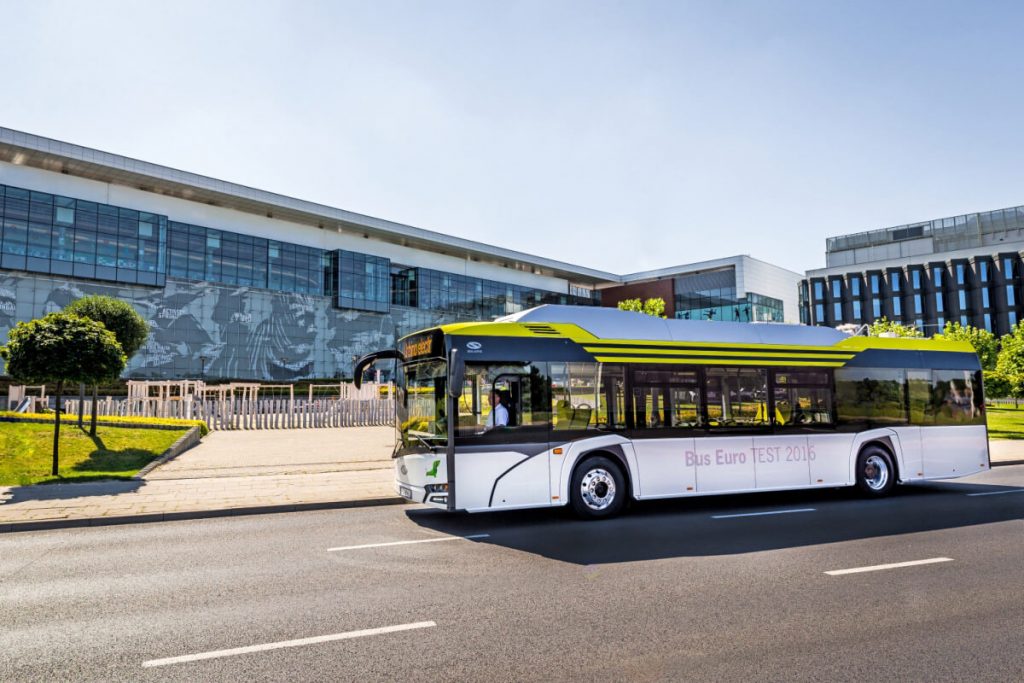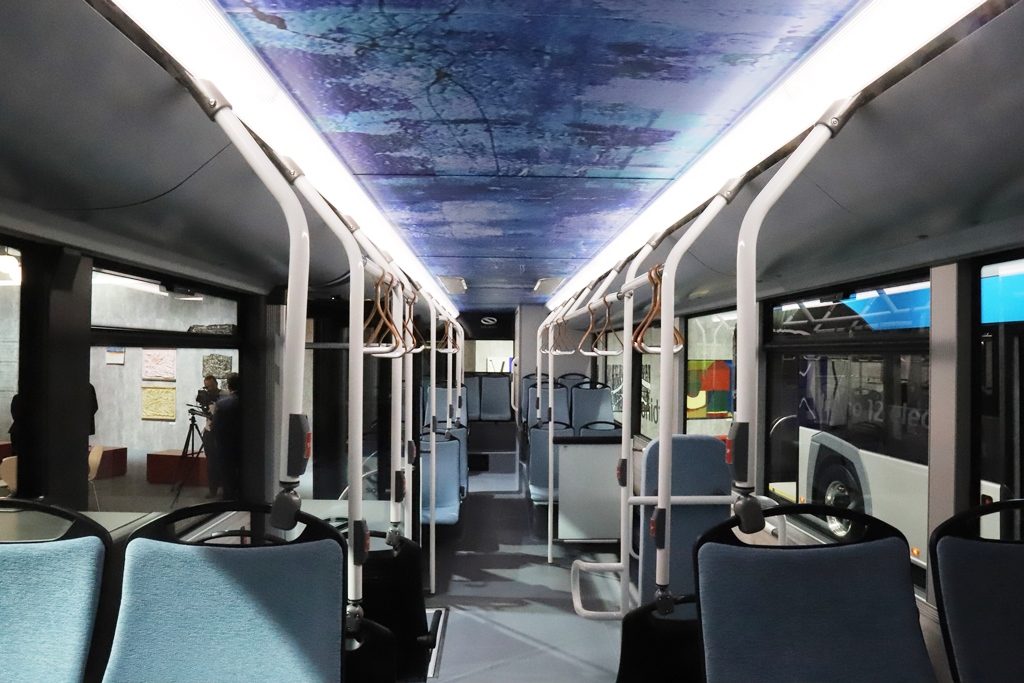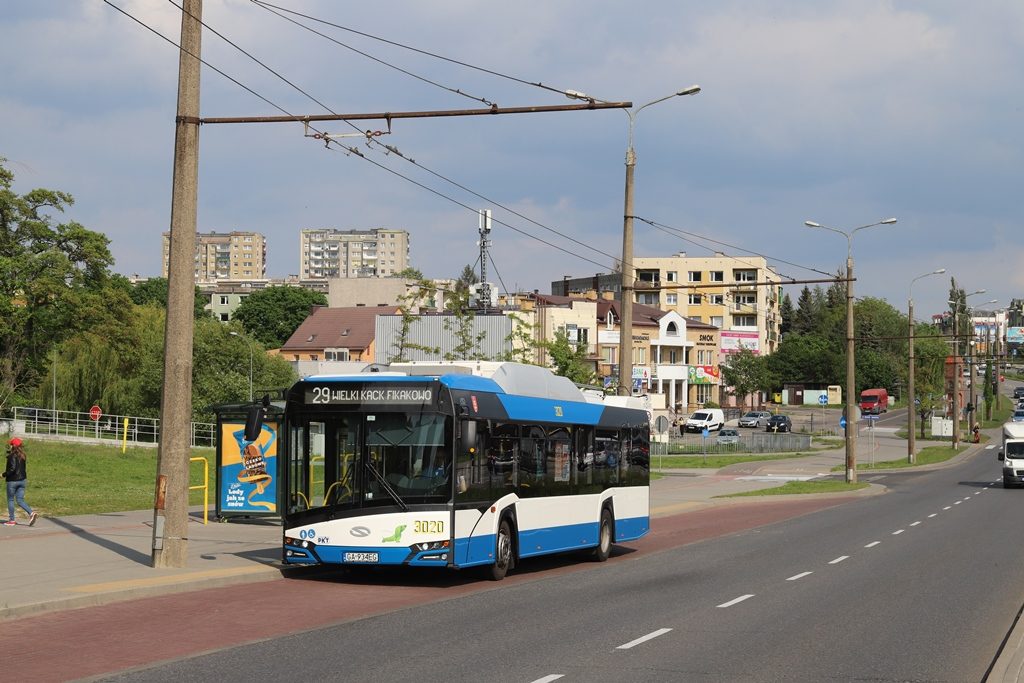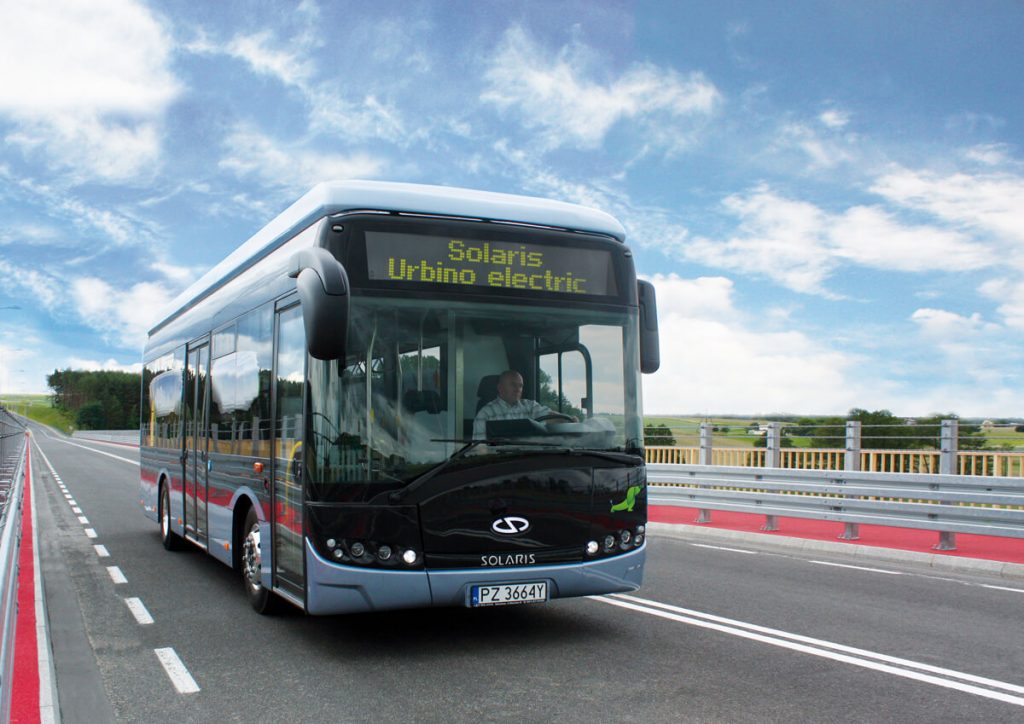
The bus manufacturer Solaris presented its’ very first Hydrogen bus at the UITP in Stockholm last week and already received a first order. The Italian city of Bolzano ordered a first fleet of Solaris Urbino 12 hydrogen buses. Alongside the hydrogen bus, Solaris also presented an Urbino Electric. The latter is now also available in the modern New Urbino design.
Solaris Urbino Hydrogen
Solaris was one of the first bus manufacturers to invest into the development of electric buses. Nearly a decade after the roll-out of its first e-bus, Solaris is now completing its’ zero-emission bus portfolio with the Urbino 12 hydrogen which is fitted with a fuel cell. The advantage of hydrogen buses is the fact that the energy density of hydrogen is much higher as the one of batteries, allowing for much longer ranges.

The manufacturer believes that the development of all electromobility branches, be that battery buses, trolleybuses or hydrogen-fuelled vehicles, should proceed in parallel, and that this development is required in order to achieve an emission-free and sustainable transport. Therefore, hydrogen-powered buses of Solaris will not compete with battery buses or models of the Trollino trolleybus series. The idea is that these technologies will complement each other and they will all benefit from the technological progress of electric drivelines and their components.
Experience in fuel cells
This is not the first time Solaris is using fuel cells in buses. The company already gained its first experience in hydrogen when it designed battery vehicles using fuel cells as range extenders. As part of the JIVE initiative, Solaris has supplied two Urbino 18.75 electric to Hamburg and 10 trolleybuses with hydrogen-based range extenders to Riga. However, this is the first time Solaris is building a bus with a fuel cell as primary energy source. The new electric Urbino 12 hydrogen is fitted with a fuel cell that acts as a miniature hydrogen power plant on board of the vehicle. The bus will be capable of covering up to 350 km on a single refill. A set of 60 kW fuel cells was used in the Solaris hydrogen buses. The bus is also fitted with a High Power traction battery which is to support the fuel cell whenever the demand for energy is the highest. The battery is filled with energy derived from hydrogen and through the regenerative braking, though it is also possible to recharge it by means of a plug-in socket. Complementing the driveline is an axle with integrated electric motors.

The light weight composite tanks are placed longitudinally above the first axle of the vehicle allow for a hydrogen storage capacity of 36.8 kg. A multifunctional valve is installed at the end of each tank; this valve includes a range of safety elements: a solenoid valve, an emergency valve activated by high temperature and an overload valve cutting off the flow of hydrogen in case of loss of containment of the system.
In order to reduce energy use to a maximum, the vehicle also features a climate comfort system with a CO2 heat pump that allows to use waste heat from the fuel cell. This solution guarantees very high efficiency and allows to increase the drive range of the vehicle even more.
First orders
The Italian city of Bolzano is the first one to order Solaris Urbino 12 hydrogen buses. SASA Bolzano will be the first customer to receive the Urbino 12 hydrogen. The contract includes an 8 year-long service and maintenance package. Part of the contract is also a special drivers’ and workshop personnel’s training emphasizing the safety aspects of using and servicing hydrogen vehicles. During the UITP Global Public Transport Summit, representatives of Solaris and Régie Autonome des Transports Parisiens (RATP) have signed a contract for lease and tests of the Urbino 12 hydrogen. The operator responsible for public transport in Paris for 10 weeks (April-June 2020) will test the Solaris hydrogen bus in regular passenger traffic. This is another step made by RATP in the preparations for transforming its fleet to completely zero emissions vehicles. In May RATP also signed a contract with Solaris for delivery of the electric bus Solaris Urbino 8.9 LE electric with the option of extending the order for another e-buses with a total value of 10 million euros.
Solaris Urbino 12 Electric
In barely eight years since the début of its first electric bus, Solaris has delivered or received orders for nearly 600 vehicles from customers in seventeen countries. Solaris has worked on the optimisation of the heating, cooling and the steering systems in order to help reduce energy consumption.

Solaris is currently delivering 12 Trollino hybrid trolleybuses with a battery range extender for catenary-free operation to the Polish city of Gdynia 
RATP in Paris ordered one Solaris Urbino 8.9 LE Electric I Solaris
The propulsion system of the Solaris Urbino 12 electric presented at the UITP Global Public Transport Summit 2019 consists of two electric engines with a peak performance of 125 kW each, installed in the drive axles. The bus is fitted with a battery capacity of 240 kWh. The vehicle version presented at the trade fair may be charged using a stationary external charger or a (34kW) onboard charger without the need to install additional infrastructure. It is the Solaris Urbino 12 electric bus that was awarded the city bus of the year title in the “Bus of the Year 2017” contest.
18.06.2019
